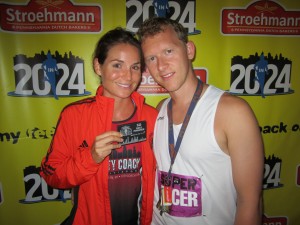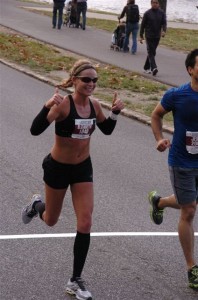
Berlin Marathon. Low mileage, lot’s of time in the gym. Pretty good PR – 3:03:30.
It’s that fun time of year when there are literally dozens of races every weekend – from small 5Ks and 10Ks to some very large half marathons and marathons. The running community is filled with taper nerves, stories of recent race experiences, and reflections and goals for the new year. It’s a pretty awesome time to be a running coach and to watch the weeks and months of careful planning and training begin to pay off with some really incredible race finishes, personal records, and lessons learned.
I find that the journey can vary quite a bit per person. We are all different, and we adapt to training, goals and work load differently. I couldn’t help but notice while I was out for an 8-miler today how many runners I passed with medical tape, braces or bands on their body. It made me a little sad, angry, ad motivated to blog about it. In the non-running community, most people still assume running is bad for our knees. In fact, I cannot count the amount of times an acquaintance or total stranger says something negative about running and joints when they hear I run and coach runners. In fact, quite the opposite is true.
This isn’t to say that repetitive wear and tear doesn’t have consequences – cyclists, swimmers, dancers, tennis players – each sport has it’s own chronic injuries due to the muscles, tendons, ligaments and joints used repetitively. However, when done the right way, we actually usually stay far healthier and active when we use our body instead of sitting on our butts. Can running mess up knees? Sure. That will vary per athlete, their genetics, history, form, training practices, and overall strength. I come from the philosophy where most injuries are preventable, and most runners you see taped up simply didn’t train well. Usually they took on too much too soon (mileage or stress), or are incredibly imbalanced and could benefit from some serious strength training, cross training, stretching – or all of the above. Most injuries are preventable. Some obviously are not, and require immediate medical attention, and the diagnosis and advice should not be ignored.
Here’s the funny thing – most injured runners will willingly admit how much they are in pain, or how much their potential has been compromised, but yet they won’t take the necessary time off to rehab and recover. As a coach, I cannot help someone who isn’t willing to take the help. That may be the toughest part of my job. Knowing what needs to happen, but having an athlete unable to accept the work load, recovery, etc – to get there.
And so after witnessing all of those taped up runners today, I thought about myself and my running. I haven’t been injured (thankfully!) since 2012. I was forced to take 8 weeks off from running back then, and it was the worst two months ever. I swore to myself I would do what I could to avoid the injured list in the future. And so I finally began to take my own coaching advice. I also began to really listen and learn from my body. Dare I say, I began to train smart. Even when clocking 100-mile weeks while Ultra Marathon training in 2014, I quickly learned I needed to eliminate all speed work and simply focus on mileage. And when I shifted back to shorter and speedier goals, I cut mileage way down, and spent just as much time weight training as I did running.
In fact, that’s what struck me today. While training in 2016, my mileage was lower than most years in the past, ranging from 35-60 miles per week – including when marathon training. I’d cap my runs to 5X per week – no more, and 2 total rest days. I also spent a ton of time lifting heavy in the gym – upper and lower body – 2-3X per week for each. And for me, that combination lead to two of my three fastest marathons ever, within a 6-month span, and minimal aches and pains and no injuries.
And not only did the above combination work for me, I made myself be incredibly smart and conservative when hopping into any other races. Did I miss out on some incredible race opportunities this year in NYC? Absolutely. Did I have regrets or FOMO? Sure. And peer pressure is a bitch. But somehow I stuck to my guns, and my goals were clear. And so I didn’t add anything potentially harmful to the big goals.
Not every runner can spend hours in a gym. Or many simply don’t want to or refuse to prioritize their time. I get it. If you are very busy and love to run, you want to spend your free hour running – not in the weight room or on an elliptical. You want to be outside in the open air. I can totally relate. However, if you start to think about the longevity of your running career, and the specificity of your goals, you may start to view your training and choices a little differently.
So when you hit your off season, whenever that might be, I encourage you to take a hard look at your running and training history, and how your body has responded. Are you healthy? What hurts and why? Were your time goals achieved? How do you mentally feel? Listen, learn, and adapt.





